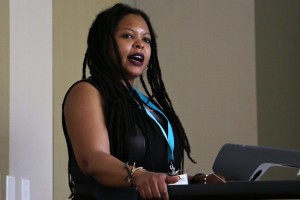I conducted an extended interview with Simone Browne, an Associate Professor of African and African Diaspora Studies at UT and a member of the HASTAC Executive Board, in November 2013 as part of my work on Zeugma. The edited interview appeared in the season 2 episode ‘Surveilling‘ (embedded below; Simone’s segment begins at 06:10), and the full interview can be downloaded from my Dropbox (direct link to .wav, huge file). We discussed a broad range of online and offline surveillance technologies, with particular attention to their raced and gendered effects in public life, and the ways that targetted communities (can) resist surveillance.
Our conversation was wide-ranging, touching on a number of the listed concerns of the Digital Dialogs: online and offline identities, privacy issues, the conditions of academic and digital labour, accessibility and the digital divide, digital activism and, in particular, race and ethnicity in the digital age.
A key part of our discussion centred on how social media operates as both a surveillant technology and a space to resist and mobilise against surveillance. Simone’s most recent book project, Dark Matters: On the Surveillance of Blackness, examined the relationship between surveillance and race, and we spent much of our interview talking through the responses of Black Twitter to pre-Ferguson police killings of people of colour.
Oh my gosh, Black Twitter, go and get them!
Because Twitter, in particular, affords users a way to mobilise instantly in response to current events, it has emerged as a key site of community formation and activist organisation. While social media is a longstanding concern of the DWRL, the organisational affordances of Twitter, as discussed here, have come to the forefront since my interview with Simone and resulted in its nomination as a Research Priority in 2014-15, ‘Activist Twitter & Race‘.
This interview served me professionally, both in terms of contacts — Simone served as one of my MA examiners and her work on surveillance is critical to my dissertation project — and content, demonstrating the clear relationship between rhetoric and the DWRL, and the interdisciplinary fields in which I work. It also served the DWRL, exposing our work to an audience beyond our local and digital-rhetorics networks when Simone promoted it to her own networks which, given her role in HASTAC, are rather extensive.
Further, the interview has longevity and serves especially well as a resource for the DWRL this year. Not only does its content explicitly engage with a core concern of our research, it offers a model for thinking through the relationship between digital rhetorics and other areas of digitally engaged scholarship — a core concern of our practice in 2015-16 as we grapple with a new staffing structure in which many (most, in fall 2015) of our staff come to the Lab from other disciplines.

